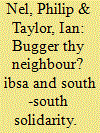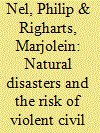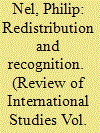|
|
|
Sort Order |
|
|
|
Items / Page
|
|
|
|
|
|
|
| Srl | Item |
| 1 |
ID:
123538


|
|
|
|
|
| Publication |
2013.
|
| Summary/Abstract |
South-South cooperation is assumed to reflect a deep attitude of solidarity among nations of the global South. We point out that, although India, Brazil and South Africa (ibsa) present themselves as being in the vanguard of South-South cooperation, their foreign economic policies make such solidarity somewhat thin. We focus on examples in which these three states deliberately but also unintentionally create sub-optimal conditions for the development of some of their Southern neighbours. This outcome reflects the policies that emerging centres of accumulation in the South are promoting, as well as the material interests of the dominant class alliances in the aforementioned states. There is a need for close scrutiny of the foreign economic policies of dynamic developing economies, and for closer multilateral coordination among the states of the global South.
|
|
|
|
|
|
|
|
|
|
|
|
|
|
|
|
| 2 |
ID:
082061


|
|
|
|
|
| Publication |
2008.
|
| Summary/Abstract |
Does the occurrence of a natural disaster such as an earthquake, volcanic eruption, tsunami, flood, hurricane, epidemic, heat wave, and/or plague increase the risk of violent civil conflict in a society? This study uses available data for 187 political units for the period 1950-2000 to systematically explore this question that has received remarkably little attention in the voluminous literature on civil war. We find that natural disasters significantly increase the risk of violent civil conflict both in the short and medium term, specifically in low- and middle-income countries that have intermediate to high levels of inequality, mixed political regimes, and sluggish economic growth. Rapid-onset disasters related to geology and climate pose the highest overall risk, but different dynamics apply to minor as compared to major conflicts. The findings are robust in terms of the use of different dependent and independent variables, and a variety of model specifications. Given the likelihood that rapid climate change will increase the incidence of some types of natural disasters, more attention should be given to mitigating the social and political risks posed by these cataclysmic events
|
|
|
|
|
|
|
|
|
|
|
|
|
|
|
|
| 3 |
ID:
100471


|
|
|
|
|
| Publication |
2010.
|
| Summary/Abstract |
Regional powers of the Global South are perceived to be agents of change. But what exactly is the nature of the change that they want? This article argues that there is some continuity between the goals of the current generation of regional leaders and that of their predecessors. The current generation tend to have more confidence in their ability to effect the redistribution of wealth, prestige, and power in the global political economy, though, and tend therefore to be more integrationist than the first generation of post-colonial leaders. The goal of redistribution is premised on a more fundamental unfinished struggle of developing countries, one that Brazil, India, and South Africa in particular have taken up. This is the struggle for recognition of developing countries as full and equal partners in the society of states, but also as states with specific development needs that are too easily ploughed-under in the spurious universality promoted by the developed North. The struggle for recognition focuses on inclusive multilateralism and 'non-indifference' towards the development needs of the Global South. Using recent contributions to the theory of recognition, the article interprets these two goals as linked to the unfinished struggle against disrespect and humiliation.
|
|
|
|
|
|
|
|
|
|
|
|
|
|
|
|
| 4 |
ID:
075090


|
|
|
| 5 |
ID:
180260


|
|
|
|
|
| Summary/Abstract |
African attitudes to income inequality have hardly been studied. As a result, we may have been missing a crucial part of the answer to the question why Africa is so unequal. This paper presents evidence that, across all self-identified class categories, African respondents in 16 African states, representative of all the regions of the continent, are on average considerably more tolerant of inequality than respondents from 43 comparable developing and transition countries. The aim of the paper is to try and explain these differences. It concludes that (a) a modified version of Albert Hirschman's notion of the ‘tunnel effect’ and (b) religious devotedness in the African context provide explanations for the observed variation between African respondents and their counterparts elsewhere. Experienced inequality, in contrast to overall income distribution, influences the tunnel effect more widely than economic growth. Religious belief shapes inequality tolerance in Africa more than the observance of religious practices.
|
|
|
|
|
|
|
|
|
|
|
|
|
|
|
|
|
|
|
|
|